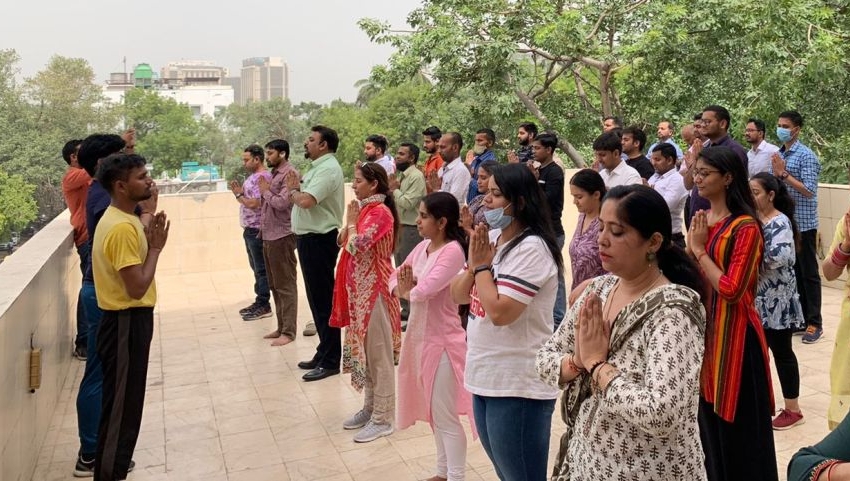
Daily practice of Yoga and understanding of its spiritual values can empower youth and relieve them of undue restlessness says Dr. Nitesh Dhawan, Public Servant, Author and Educator
On 21st of June every year, the world celebrates the International Yoga Day and as a ritual, we are high on visuals but fail to imbibe the morals. It is high time we embrace Yoga as way of life by having deep understanding of its inherent spiritual values. It will add much more essence to our disgruntled lives.
The greatest human fear is validation. We seek meaning, as who we are? What is our role in this world? This fear crumples our mind (chitta) and creates impressions (samskars). The current scenario of hatred and tension reflects this fear out of which social hierarchies are created. The frightened, hence crumpled, disconnected mind turns into aham.
Contrary to this, the mind that is not crumpled, hence connected is referred to as atma. Yoga is about moving from aham to atma.
Patanjali, in his Yoga-sutra, written around the time of The Gita, defines yoga as stopping the rippling and twisting of the mind (chitta-vritti-nirodha ) caused by various experiences and memories that result in disconnection.
He gives eight-step process to curb this chaos and restore the divine connection. With each step, we move closer and inwards through the containers that constitute the body.
- With yama, we limit social engagements by not indulging in sex, violence, falsehood, theft and greed.
- Then, with niyama, we discipline ourselves by practising cleanliness, contentment, austerity, reflection and having faith in divinity.
- Through asana, where we activate the body by using various postures.
- Fourth, is pranayama, through which we regulate the breath.
- Fifth is pratyahara, to withdraw from sensory inputs.
- With dharana, we become aware of the larger picture and gain right perspective.
- With dhyana, we become meditative
- With samadhi, we delve deep within to experience our emotions and discover our fears.
The Gita comprises all the practices mentioned in the Yoga-sutra. Krishna speaks of using the breath to make the journey from outside to inside.
Arjuna, ignore the onslaught of external stimuli and focus between your eyebrows, regulating inhalation and exhalation at the nostrils, to liberate yourself from fear, desire and anger, and discover me within you. I who receive and consume every offering of your yagnas.- Bhagavad Gita: Chapter 5, verses 27 to 29 ( paraphrased).
There is also a reference to meditation in The Gita: sitting still and calming the mind until one’s breath is natural and rhythmic.
Arjuna, sit still on a mat that is neither too high nor too low. Your head, neck and back aligned, still your senses, focus your mind, gazing at the nosetip.- Bhagavad Gita: Chapter 6, verses 11 to 13 (paraphrased)
Yoga is not about doing physical exercise in the form of asanas but being aware of our mind, body and soul. It enables us to be mindful of natural forces of attraction (raga) and repulsion (dvesha), and not be swept away by them. Krishna says-
Arjuna, your mind is your friend and your enemy. If you control the mind, it is your friend. If your mind controls you, it is your enemy.- Bhagavad Gita: Chapter 6, verses 5 and 6 (paraphrased)
Good at composing jingles? We have the perfect opportunity for you! Participate in the jingle contest for the upcoming International Day of Yoga 2022 and stand a chance to win a cash prize of ₹25,000. Visit: https://t.co/23tYMu9m9k pic.twitter.com/1O5hIexqV3
— MyGovIndia (@mygovindia) June 8, 2022
In today’s social context, our mind is controlling us and this is the cause of all evils committed by people, be it social hatred, violence or corruption. Today’s youth has forgotten the path shown in spiritual scriptures like Bhagavad Gita and Ramayana. Their notion about Yoga is superficial and not eternal. We have abundance of inner strength which could be illuminated by the guiding light of Yoga and spirituality. When the youth is engrossed in dissipating their energy on worthless and petty matters, how can a nation of enriching young human resource could think of becoming a world power. The youth needs to be enlightened before the country’s demographic dividend turns out to be a demographic curse.
There is one way, The Gita departs from the Yoga-sutra. While the Yoga-sutra speaks of complete negation of the material world, Krishna’s Gita describes Samadhi as the ability to see the world with perfect equanimity, without judgement. And when we become non-judgmental and see everything equally, the feeling of superiority or inferiority doesn’t arise. The prejudice, bias and discrimination against others never comes into mind.
Yoga is a spiritual practice well embedded in Indian philosophy which has amicable solutions to existing challenges of Indian society. We need to understand it in deeper sense, nurture it in our daily lives and propagate it to all sections of the society.










